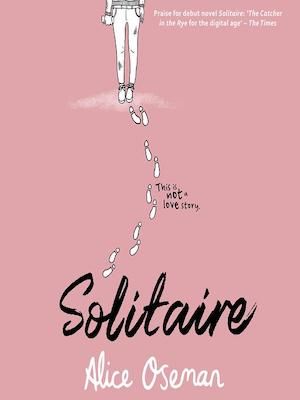Before she was the author of the global sensation that is the Heartstopper graphic novels, Alice Oseman received her first publishing deal at the age of 17 and released her first novel called Solitaire in 2014. The YA novel follows Victoria “Tori” Spring, a sullen, antisocial teen who some people might recognize as a character from Heartstopper. That’s because Tori’s story in Solitaire is what started it all: her brother Charlie and his boyfriend Nick are well into their relationship when we first meet them here, and it was their popularity online that eventually led Oseman to create their own series in the form of graphic novels.
|
|
Tori Spring is just like any other teenager, as long as you also enjoy time alone in your own house not talking to anybody. She likes to sleep and she likes to blog. She’s fiercely protective over her younger brother Charlie and all that he has gone through over the last few years. Tori has a group of friends but is rather apathetic to them all. But suddenly Solitaire appears in her life: a mysterious blog dedicated to pulling pranks around her school in order to draw attention to some larger mission. As the pranks become increasingly more dangerous, Tori learns, along with the help of a new male friend Michael, that sometimes one voice is all it takes to do what’s right.
Initial reviews for Solitaire were mixed. The Guardian was impressed by Oseman’s young success but they didn’t think it was “amazingly good.” Kirkus Reviews found fault with Tori’s “unpleasantness,” and The Sunday Times not only declared Oseman to be “a very authentic, teenage voice,” but that Solitaire was like “The Catcher in the Rye for the digital age.”
I was sadly a Johnny-come-lately when it came to Oseman’s work, only seeking out her previous novels after the large success of Heartstopper last year. I plowed through the Nick and Charlie and This Winter novellas as well as Radio Silence, but Solitaire was one title I kept hesitating on picking up, solely because of the starkly mixed reviews I was seeing on Goodreads.
Most people on my feed were unimpressed mostly due to Tori’s deep pessimism and her refusal to seek treatment for her obvious symptoms of depression. One found great fault in Tori and her peers’ general coping mechanisms and how they let their teen angst “consume” them, and another was completely turned off, again, by Tori’s “unpleasantness” and her unnecessarily mean inner dialogue. Most other mixed or negative reviews that pop up on the platform opine that it’s fairly obvious Solitaire was written by a 17-year-old girl, and that there’s just no clear distinction of what the story’s about. Love? Family? Depression? Bullying? Friendship? A mystery? (It’s all of the above, Janice!)
 |
It’s at this point that I should clarify that when I read Solitaire for the first time this past February, I was reading a later edition of the book that reflects editorial changes that Oseman made to the narrative in August 2020. According to the author’s website as well as an author’s note at the beginning of later editions, she made changes to make the narrative more in line with the events of Heartstopper as well certain passages that were “particularly harmful or sensationalized.”
In a guest piece for Epic Reads in 2014, Oseman wrote that since the novel was published, Tori’s character has been called many things. “She has been called an overdramatic, silly teenage girl. She has been called whiny and annoying. She has been diagnosed with severe depression, has been pronounced mentally ill, and I have been lauded for my portrayal of depression in young adults. I wrote Solitaire because I was a very sad teenage girl,” she stated.
“I have never been diagnosed with depression. At fifteen, sixteen, seventeen, I understood myself to have very much the average sort of ‘sad.’ I cried sometimes at the end of the day. I felt lonely most of the time. I was angry about everything, I didn’t have very many friends, I hated school with an absolute rage, I listened to sad music on the bus. I properly and utterly hated myself, for a whole array of reasons. Adults call this ‘teenage angst.’ I believe that ‘teenage angst’ is a pathetic and patronising way of phrasing feelings that millions of teenagers (and, let’s be honest, adults too) experience. I just call it what it actually is — an emotion. ‘Sad.’ All of this went into my book. All of the sad.”
There isn’t much evidence online as to what exactly Oseman changed in Solitaire’s narrative six years after it was published, but it’s safe to assume they would have had to be minor changes, or else diehard fans of the novel and author would have something to say about it. All I can say is that Solitaire does not sensationalize mental illness: if anything, the novel was considered groundbreaking and declared The Catcher in the Rye for the digital age because it allowed young readers the time and space to reflect on their own feelings of sadness. Maybe it’s a sign of something larger and serious, maybe it’s just an emotion. But Solitaire is one of few YA novels to both actually get this sentiment right and allow the space for it.
That’s not to say that Solitaire isn’t a downer, because it is. A novel that deals directly with sadness in its central protagonist isn’t exactly the recipe for a happy story. But not everything in life, and especially during specific periods of youth, is always happy. It’s easy to understand how previous generations who did not come of age with the Internet would find fault with Solitaire’s portrayal of mental health, as well as the deliberately misogynistic claims that the novel is no good because it was written by a 17-year-old girl.
But as someone who attended high school in the early 2010s, Solitaire gets everything right about what it was like to be a teenager during that time, when smartphones were just catching on and social media was just about to become a central part of everyone’s everyday life. This can be a sensitive area for differing schools of thought who are quick to claim that teenagers from this period on are all depressed because of the Internet in their pockets, and it’s just “teenage angst” for the digital age. And as someone who was only properly diagnosed with an anxiety disorder in my mid-20s, sometimes there are big red flags that adults don’t pick up on that have nothing to do with the Internet.
I have to agree with Oseman: dismissing young people’s emotions as merely teen angst is indeed pathetic and patronizing, let alone harmful. Once again, Solitaire positions these feelings as relatable and accessible in a way that few other YA novels of the era were able to do. Oddly enough, this isn’t a novel I wish I would’ve had when I was younger, because I think it would have only alienated myself further from what I was feeling at the time — something akin to “I’m in this photo and I don’t like it.” I think Solitaire was a YA book I needed to read once I was almost a decade older than the characters so I could look back retroactively and be thankful that I wasn’t alone in those feelings of sadness. Because angst and sadness are two different things.
Related Reading
Heartwarming Queer YA Books like Netflix’s Heartstopper
5 YA Books That Tackle Mental Health Issues
Source : Don’t Just Call It Angst: Mental Illness in Alice Oseman’s SOLITAIRE










